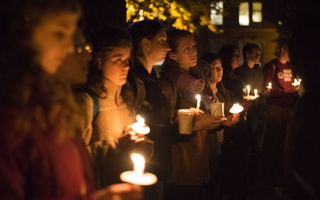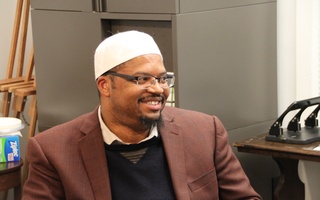After a months-long election season calling for a “complete and total shutdown” of Muslims entering the United States and the arrival of a presidency many say stirred nationwide Islamophobic sentiment, violence against Muslim Americans intensified beginning in late 2016.
Harvard was not exempt.
Just days after the election, Harmann Singh, a first-year student at Harvard Law School, was called a “f***ing Muslim” while at a store in Harvard Square. In an op-ed in the Boston Globe, Singh recalled how no one questioned his aggressor as he followed Singh around, repeatedly asking him where he was from.
The incident was only one of many across the nation. According to a May report from the Council on American-Islamic Relations, Islamophobic incidents increased by 57 percent in 2016, and hate crimes targeting Muslims increased by 44 percent during the same period.{shortcode-08725ac451aaa92ae5b975c2f51ed388dbe5f632}
Many across Harvard emphasized that they would not tolerate anti-Muslim discrimination. In a November email, University President Drew G. Faust lamented “escalating numbers of cruel and frightening incidents” both at Harvard and nationwide. She later announced the start of a search for the University’s first full-time Muslim chaplain, and vigilantly opposed a White House executive order that looked to bar immigration from several Muslim-majority countries.
Muslim affiliates say they are pleased to see a commitment to Muslim students, though they noted Harvard could increase financial resources to better welcome the vulnerable group.
As discrimination against Muslim Americans became more visible across the United States, Harvard students say they experienced its consequences. In addition to less subtle acts of Islamophobic aggression, some students say they felt hurt by peers with political opinions they found offensive.
“I was amazed how a few people were turning things and twisting them around to make it sound like the stuff that Donald Trump was doing was not necessarily racist,” said Sahar Omer ’20, a member of the Harvard Islamic Society—an undergraduate Muslim affinity group—and an active Crimson editor. “At this point, how does someone convince you that the stuff that you’re saying has ramifications that really do affect me and a lot of other people?”
Omer and others said they found students with discriminatory opinions to be in the minority, but still felt it was difficult to separate their student experience from changing political tides.
For Anwar Omeish ’19, the Islamic Society’s director of external relations, this was impossible.
“When the literal president of the United States is talking about how your community should be banned, that’s significant.” Omeish said. “No matter how much you try to separate in your head what’s happening outside and what’s happening on campus...it affects the way you experience this place.”{shortcode-d8bb4b5d67f6c0c8463581cc8231287e73f4a071}
A majority of Harvard undergraduates identify as liberal, and roughly 87 percent of respondents to a Crimson election survey said they would vote for President Donald Trump’s Democratic contender, Hillary Clinton, in the November election. But despite living at a left-leaning campus largely disapproving of Trump’s rhetoric, Omeish said she felt “isolated” because students largely did not understand the profound effect such rhetoric had on her identity and life at Harvard.
“It’s because I’m thinking and stressing and processing this thing all the time… and I don’t know how to express this energy and stress in me to people around me who are just going about their daily lives and the way they would have regardless,” Omeish said.
Muslim students and their allies across the University took to activism to express their experiences and protests, hosting teach-ins, rallies, and vigils after Trump’s election.
Professor of Indo-Muslim and Islamic Religion and Cultures Ali Asani said Islamophobia has always been embedded in the United States and in Muslim Americans’ experiences. The election results only fueled it.
“The [latent racism] was already there. The election, his rhetoric, that's what he was whipping up. And once he was elected, it became even more bold,” Asani said.
Some students took the aftermath of the election as an opportunity to further bring Harvard’s Muslims together to cope.
“I could tell very obviously that people were looking for a space, and I was very fortunate enough to be able to help create that space,” said Kennedy School student Omar El-Halwagi, who organized a vigil in February shortly after Trump signed his travel ban.
“I think it was just a time where people needed to take a minute and step away from all the political activism that people were doing and the organizing and have a moment to maybe reconnect spiritually, and have a moment to exhale,” he added.
Even with the positive outcomes of an otherwise troubling election, some students now find themselves burdened with an expectation to represent all Muslims.
For El-Halwagi, this is complicated by an already difficult task of being a student.
“There is an additional tax placed on Muslim students to not only have to navigate the regular experience of being a student, but on top of that, you also have to figure out how you can advocate for your community,” El-Halwagi said.
Following a concussion while preparing for final exams, Omeish said she had to create a presentation for faculty members on institutional Islamophobia after the election, which made her feel overburdened compared to non-Muslim students.
“I literally had a concussion, and I still ended up being the person who had to give this presentation to faculty and tutors and staff,” she said. “That’s not something our students should be expected to do.”{shortcode-678e9fe3d7efb22efbeccfa46b9c5b2a3d5f960a}
Omeish said discussions about Islamophobia and discrimination are often wrongly grouped into a single story. She said she is often asked to do “institutionalized Islamophobia presentations” for groups on campus and in Boston.
“People sometimes still do approach it as, ‘Tell us what the Muslims think’ and I'm like, I cannot,” Omeish said. “What does it mean to represent Islam correctly and fully? There is such a diverse set of experiences within Islam and within the Muslim community.”
After Trump issued an executive order barring immigration from seven majority muslim nations, Harvard announced it would begin searching for a University-funded, full-time Muslim chaplain.
Students have for some time pushed for a full-time chaplain, and Muslim students currently do not have even a part-time religious advocate of this kind.
In an email to Harvard affiliates in January, Faust said that the hiring of a new chaplain was in recognition of “the special concerns of the Muslims among us at this moment in our national life” and that a chaplain would provide “more tangible ways to support [Muslims’] distinctive needs.”
The previous Muslim chaplain, Taymullah Abdur-Rahman, had only worked part-time and was funded by the Harvard University Muslim Alumni.
“Taymullah was great,” Omeish said. “But his position was limited in what it was able to do because it was part time and served all of the schools.”{shortcode-332872d97bcabc0ef08f7993c4b7f7acf7a903f6}
Many students and faculty have responded positively to the news of the hiring, noting that the decision was unprecedented. While Harvard has 35 chaplains representing a variety of belief systems and sects within them, many chaplains are either volunteers or are paid for by outside student groups and churches.
“I think that is one very strong sign of solidarity, particularly for a group of students on campus who need someone who can be able to assist them through this difficult time both politically and socially,” said El-Halwagi, who is on a committee to search for the chaplain.
The chaplain will serve as a “spiritual and mental health resource,” according to Islamic Society President Zarin I. Rahman ’18. Rahman said she looks forward to “having someone to talk to and to help advocate for our needs that we ourselves have been advocating for for decades.”
Omer said she expects the presence of a chaplain to make a “huge difference” in guiding students through faith, and that it will allow Muslims at Harvard to devote more time and energy to their spirituality.
“I think [the Muslim community] will move from being a social group to one that will actually help kids on campus with their religious knowledge and religious teachings and what not,” Omer said.
While students praise the hiring of a full-time Muslim chaplain, they have said that they hope the administration will continue to provide tangible support—mainly in the form of financial investment in Islam on campus.
Noting limited funds for groups like the Islamic Society, students say they want increased funding for Muslim student programming, and construction of a “Muslim student life center”—which already stand at schools like Princeton and Duke—to supplement Harvard’s existing prayer spaces.{shortcode-d0f7cc413fc84f8d079c2ba991e8f347da596cd6}
Harvard administrators have previously said they are open to creating a similar multicultural student center, though some like Dean of the College Rakesh Khurana have cited local space constraints as a barrier from beginning construction.
According to Rahman, one issue facing the Islamic Society is a lack of funding for the programs it runs for Muslim students. She noted that compared to other religious groups on campus, the Islamic Society does not have as large of an alumni network to help support its programming.
“We host Ramadan events because Ramadan is in the summer,” Rahman said. “Term-time, we can apply for grants. But during the summer, we have to fundraise for that.”
College spokesperson Rachael Dane did not respond to requests for comment for this story.
Omeish emphasized that although their incoming chaplain marks a major step in Muslim student support, the University should not stop there.
“A lot of the issues students of color are raising—diversity of faculty, ethnic studies—all of these things also intersect with the needs of Muslim students,” Omeish said. “So yes, it's great that we have this Muslim chaplain, but there's also a lot more we can be doing.”
—Staff writer Angela N. Fu can be reached at angela.fu@thecrimson.com. Follow her on Twitter @angelanfu.
—Staff writer Alexis J. Ross can be reached at alexis.ross@thecrimson.com. Follow him on Twitter @aross125.


